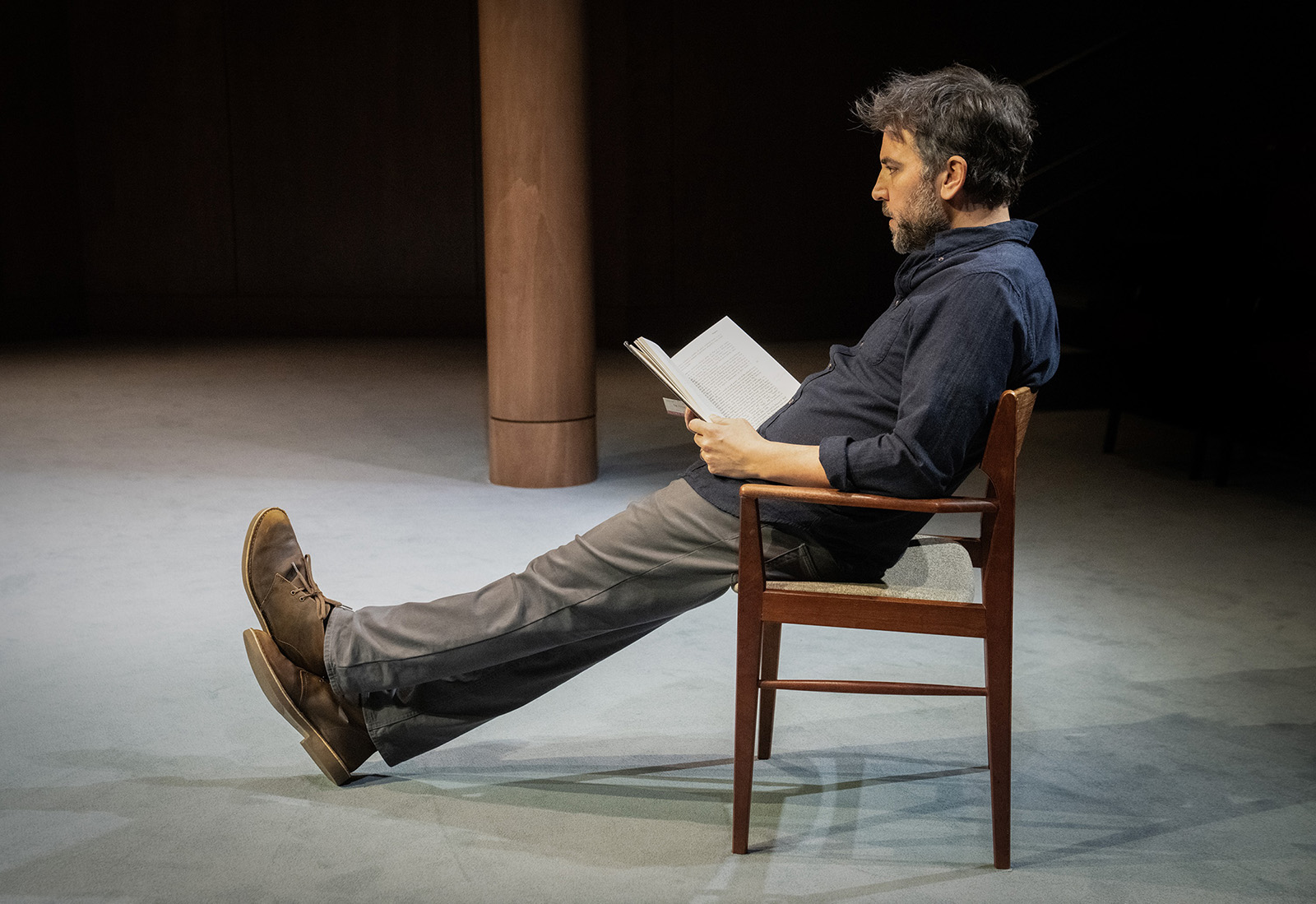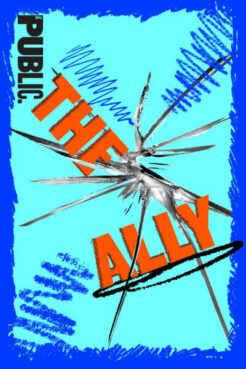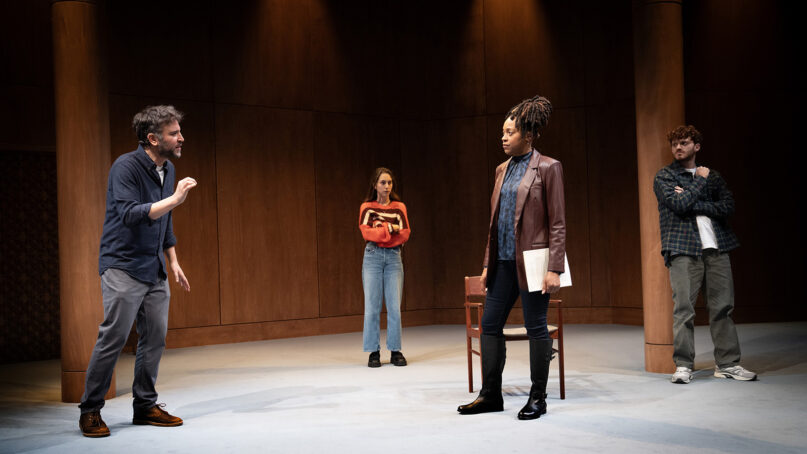(RNS) — How can people with opposing points of view who inhabit the same spaces — a campus, a neighborhood — share their ideas in a way that promotes deep listening?
Describing the difficulties of playwrighting, Itamar Moses, whose new play, “The Ally,” had its premiere at New York’s Public Theater in February, wrote in his program notes that sometimes the best way to realize a challenging scene is “to stage the problem.”
The problem “The Ally” stages is that of differing perspectives about the modern state of Israel. By allowing his characters to present multiple viewpoints and how they affect one individual Jew, Asaf Sternheim (played by Josh Radnor of “How I Met Your Mother”), Moses finds a way to enable dialogue, serious thought and deep listening about an issue about which no one is able to speak courteously, least of all with those whose points of view don’t align.
Moses, who won a Tony for his 2016 adaptation of the musical “The Band’s Visit,” started writing “The Ally” in the Obama era, and the play later endured a two-and-a-half-year delay due to COVID-19, not knowing that a play that gives expression to each facet of Israel’s complicated existence, when finally performed, would feel like a minor miracle. Today, more than 160 days into the Israel-Hamas war, being able to listen to Moses’ dialogue, even those things that are difficult for me to hear, is exceptionally meaningful, even joyful.
Asaf, a 40-something playwright and a seasoned ally of the ethnically and ideologically “othered,” has moved to a college town with his Korean American wife, Gwen (Joy Osmanski), a student housing administrator. Among Gwen’s new duties is to oversee the building of new dorms in a way that doesn’t encroach “too much this time” on the adjacent African American neighborhood of Bottomville. Coincidentally, the community organizer in Bottomville is Nakia, Asaf’s college girlfriend. Baron, the standout in Asaf’s undergrad screenwriting course, grew up in Bottomville.

Actor Josh Radnor in “The Ally” at New York’s Public Theater. (Photo by Joan Marcus)
The other perspectives come from Rachel and Farid, the Jewish and Palestinian organizers, respectively, of an organization that sponsors speakers to come to campus who are critical of Israel, and Reuven, a graduate student in Jewish history who commands a voice able to yell at Israeli volume, though he is actually from New Jersey.
There is plenty to pluck at Asaf’s liberal tendencies. Gwen is pained by the story of a student of Asian heritage who was murdered years before, having been driven off campus into local housing by his fellow students’ prejudice. Baron’s cousin, meanwhile, has been killed by campus cops, who accused him falsely of stealing cars. Farid talks about his family in Palestine and the difficulties they have faced since the inception of Israeli rule in 1948, while Rachel and Reuven share the pain of the weight of historical Jewish trauma.
Moses manages to imbue the distress with humor, and the actors are a delight as they inhabit their fiery and forlorn perceptions of historical and immediate insults. Radnor beautifully captures the self-abnegation as heterosexual white man, the son of Israeli immigrants, trying his best to respond appropriately, despite his cringeworthy inability to listen to his wife or make necessary decisions. (Cherise Boothe, whose stage time as Nakia is second only to Radnor’s, adroitly pivots to play a second character who offers healing at the play’s conclusion.)

Poster for “The Ally” at New York’s Public Theater. (Courtesy image)
The non-committal Asaf is undone by his wide sympathies. He runs into trouble when Baron comes to tell his professor that his cousin has been murdered and asks Asaf to sign a petition, written by Nakia, against police brutality. Charged for action, Asaf signs despite reading the manifesto’s foment against Israel as an apartheid state. He also falls prey to the pro-Palestinian activists’ request that he sponsor their latest speaker.
A passage from the Talmud in Bava Metzia 37B, “Silence is the equivalent of agreement,” is quoted three times in the play, and each time it tolls for Asaf a bit differently. Asaf does not quite comprehend what that line is asking him to do. In essence, Asaf must learn to spend time interrogating himself as a Jew — what does it mean to ally with our own people as well as others? The audience is led to ask ourselves the same question: How much to identify with our own tribe, while listening to and understanding the grievances and pain of others at the same time.
At the end of the play, the campus rabbi — a Black woman — becomes Asaf’s guide in this. The rabbi does not tell Asaf what to do, but gives him a practice and tells him to take all the time he needs in her office as she goes out to join a protest of the not guilty verdict against the police who have killed an unarmed African American young man.
In his new book, “Judaism Is About Love,” Rabbi Shai Held writes, “for oppressed groups, although there may be costs to being angry, there are also costs to not being angry.” For the protagonist of “The Ally,” the cost of not being angry — of not speaking up when he hears antisemitic views even from people who have themselves experienced prejudice — is something he has to ruminate on and decide where to put his efforts.
As Asaf lowers himself into a chair to think, we suspect he will learn that he must descend in order to ascend.
(Beth Kissileff is the co-editor of “Bound in the Bond of Life: Pittsburgh Writers Reflect on the Tree of Life Tragedy.” The views expressed in this commentary do not necessarily reflect those of Religion News Service.)





